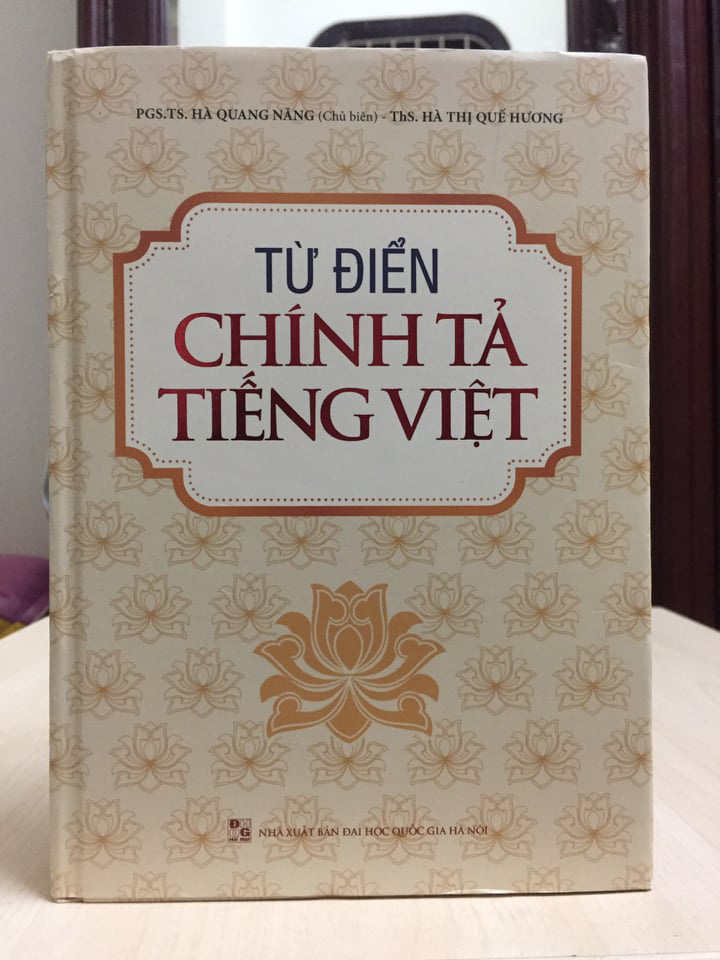After one Vietnamese dictionary was put under public scrutiny and pulled from the market for containing misspelled words, many local experts have publicly pointed out the urgent need to develop a uniform system of Vietnamese spelling and make it into law.
Within the last four months, two high-volume dictionaries have been withdrawn by Vietnam National University Publishing House: one for its copyright violation, the other for the heated debate surrounding its questionable spelling choices.
Spelling issues prevail in publication
According to veteran linguist Hoang Tuan Cong, this is not the first instance of misspellings detected in Vietnamese dictionaries.
Since 2014, Cong has logged around ten published dictionaries with spelling errors in them, only half of which have been withdrawn by their publishers.
Cong heavily condemned the irresponsibility of publishers who ignore errors in such essential academic publications.
At the same time, he endorsed stricter regulations in Vietnam’s Publishing Law to protect the purity of the Vietnamese language, including mandatory duty for dictionary compilers to declare their identity, as well as the involvement of editors and independent professional councils, who will also be held accountable for the accuracy of the dictionaries.
Assoc. Prof. Nguyen Van Chinh from the faculty of Vietnamese studies from the University of Social Sciences and Humanities in Hanoi cites the circumstances of spelling errors in dictionaries to point out an issue within the publishing industry in Vietnam: there are currently no legal papers regulating Vietnamese orthography.
Vietnamese linguists have not yet settled on a correct spelling for certain words, and in many instances this has led to an overtly loose practice where two different spellings of a word are accepted in everyday use.
Orthographic guidelines are only used in a few sectors, while an official spelling guideline is still a work in progress, Chinh said, adding he endorses the development of standard Vietnamese orthography.
In need of a leading agency for law drafting
Nguyen The Ky, director of national radio broadcaster Voice of Vietnam (VOV), also expressed immense concern for Vietnamese spelling issues and is a vocal advocate of standard Vietnamese orthography.
He completed a doctoral program in linguistics with a dissertation on the language of Vietnamese television.
VOV, the Linguistic Society of Vietnam (LSV), and the National Assembly Committee for Culture, Education, Youth, Adolescents and Children (CCEYAC) had discussed a roadmap for the development of the prospective 'Law on the Vietnamese Language' in 2019, Ky said.
According to Ky, VOV would live up to its moniker ‘Voice of Vietnam¹ by taking the role as the lead agency for drafting the law on Vietnamese orthography.
“Every country needs a strong enough legal paper to protect the language of that nation. With a law on the Vietnamese language in place, all shop-front signs and agency signages would be obliged to display Vietnamese as the largest, most visible component compared to other languages. Spelling among institutions would also be subject to one standard,” Ky said.
Phan Thanh Binh, chairman of CCEYAC, declared the support of the agency for the standard Vietnamese orthography law, which is supposed to solve multiple complicated issues in the language.
He cited the debate over standard and dialectic pronunciation in Vietnamese as an example.
According to Binh, the law would predicate a consistent approach in teaching Vietnamese pronunciation in schools, as well as a solid framework to allow dialectic pronunciation in the lawmaking National Assembly.
The law should also draw the border between scientific research and official standards while appointing certain agencies with the authority to approve future reforms of the Vietnamese language.
Vietnamese PM Nguyen Xuan Phuc is a backer of the bill on Vietnamese orthography, said Binh.
However, the lack of leadership in the legal drafting process stands as a major hindrance.
The government deems VOV to be ill-fitted to take the lead, while the Ministry of Culture, Sports, and Tourism and the Ministry of Education and Training are considered more viable options.
According to Binh, the CCEYAC would send an official document to the National Assembly to discuss the development of the Vietnamese orthography law.
The CCEYAC has also worked with VOV, LSV, the Vietnam Academy of Social Sciences (VASS) as well as the Vietnam National University, Hanoi on the Vietnamese orthography law and reached a unanimous agreement on moving forward with studying the law.
Law pivotal to protecting Vietnamese language
According to Prof. Nguyen Van Hiep, president of the LSV, the 2013 Constitution of Vietnam declares Vietnamese the official language of the country.
This is an important basis for the discussion between the CCEYAC, VASS (of which LSV is a member), and VOV on formulating the law on Vietnamese orthography.
Even with a Vietnamese orthography law in effect, Hiep said, it would not and should not dictate every single use of Vietnamese in practice.
Instead, the law should focus on sketching general guidelines, including instructions on Vietnamese spelling and spelling standards.
Throughout history, the Vietnamese language has consistently evolved and has reached a certain extent of institutional stability.
Vietnamese reform initiatives have also emerged sporadically since the late 19th century, none of which achieved success.
Still, it is worth continuing to discuss one standout issue: a common spelling system that mediates pre-existing conflicts in the language, he said.
Like us on Facebook or follow us on Twitter to get the latest news about Vietnam!


















































